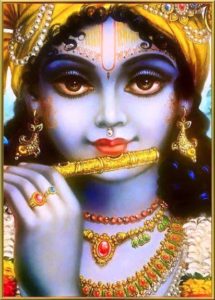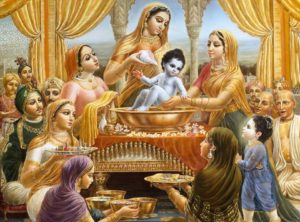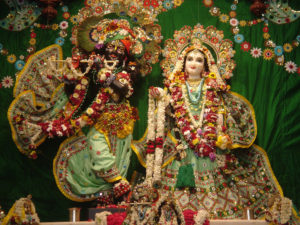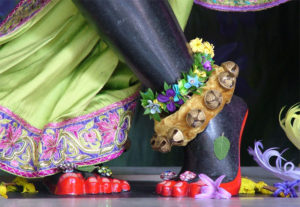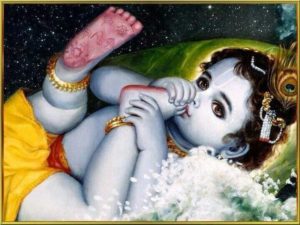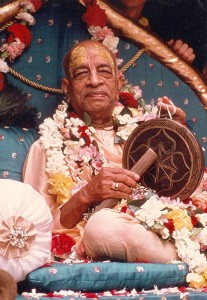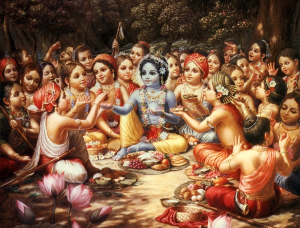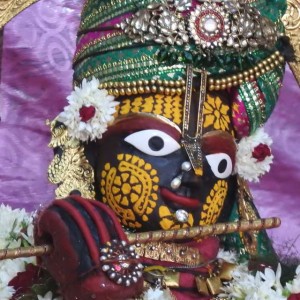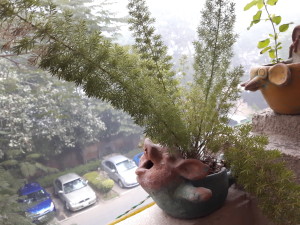Hare Krishna.
2nd Oct, 2016. Gurgaon
Many a times we read or hear about the term ‘oneness’ with God. Unfortunately, most of the time this terms is misunderstood by mayavadis as merging with God/Brahman and hence looked down upon by the devotees. Srila Prabhupada, as usual, gave us so much clarity on this term by explaining how a vaishnava practices oneness with Krishna. I read the below verse last evening and it was so nectarean, I read it repeatedly and every time I learnt something new to aspire for. I am sharing the same with all of you hoping it will help all of us clear what is actually meant by oneness with God and how to practice it in our daily life.
muktāśrayaṁ yarhi nirviṣayaṁ viraktaṁ
nirvāṇam ṛcchati manaḥ sahasā yathārciḥ
ātmānam atra puruṣo ’vyavadhānam ekam
anvīkṣate pratinivṛtta-guṇa-pravāhaḥ
Translation:
When the mind is thus completely freed from all material contamination and detached from material objectives, it is just like the flame of a lamp. At that time the mind is actually dovetailed with that of the Supreme Lord and is experienced as one with Him because it is freed from the interactive flow of the material qualities.
(SB 3.28.35)
Srila Prabhupada writes in his purport of the above verse:
In the material world the activities of the mind are acceptance and rejection. As long as the mind is in material consciousness, it must be forcibly trained to accept meditation on the Supreme Personality of Godhead, but when one is actually elevated to loving the Supreme Lord, the mind is automatically absorbed in thought of the Lord. In such a position a yogé has no other thought than to serve the Lord. This dovetailing of the mind with the desires of the Supreme Personality of Godhead is called nirväëa, or making the mind one with the Supreme Lord.
The best example of nirväëa is cited in Bhagavad-gétä. In the beginning the mind of Arjuna deviated from Kåñëa’s. Kåñëa wanted Arjuna to fight, but Arjuna did not want to, so there was disagreement. But after hearing Bhagavad-gétä from the Supreme Personality of Godhead, Arjuna dovetailed his mind with Kåñëa’s desire. This is called oneness.…When the mind is completely purified in love of Godhead, the mind becomes the mind of the Supreme Personality of Godhead. The mind at that time does not act separately, nor does it act without inspiration to fulfill the desire of the Lord. The individual liberated soul has no other activity. Pratinivåtta-guëa-pravähaù. In the conditioned state the mind is always engaged in activity impelled by the three modes of the material world, but in the transcendental stage, the material modes cannot disturb the mind of the devotee. The devotee has no other concern than to satisfy the desires of the Lord. That is the highest stage of perfection, called nirväëa or nirväëa-mukti. At this stage the mind becomes completely free from material desire.
Vaishnava oneness is different
One can attain direct contact with the Supreme Personality of Godhead in full Kåñëa consciousness and revive one’s eternal relationship with Him as lover, as Supreme Soul, as son, as friend or as master. One can reestablish the transcendental loving relationship with the Supreme Lord in so many ways, and that feeling is true oneness.
In the transcendental world, the servant and master are one. That is the absolute platform. Although the relationship is servant and master, both the servant and the served stand on the same platform. That is oneness.
(SB 3.32.11p)
Everyone should come to the platform of Kåñëa consciousness and thus feel oneness as a servant of the Lord. Although there are 8,400,000 species of life, a Vaiñëava feels this oneness. The Éçopaniñad advises, ekatvam anupaçyataù [Éço 7]. A devotee should see the Supreme Personality of Godhead to be situated in everyone’s heart and should also see every living entity as an eternal servant of the Lord. This vision is called ekatvam, oneness. Although there is a relationship of master and servant, both master and servant are one because of their spiritual identity.
(SB 7.5.12)
Oneness is actually based on oneness of interest. A pure devotee has no interest but to act on behalf of the Supreme Lord. When one has even a tinge of personal interest, his devotion is mixed with the three modes of material nature.
(SB 3.29.9p)
The devotee therefore endeavors to apply everything in the service of the Lord because he knows that everything is the property of the Lord and that no one can claim anything as one’s own. This perfect conception of oneness helps the worshiper in being engaged in His loving service
(SB 2.6.23p)
Our philosophy of Kåñëa consciousness is the same, but instead of becoming one with Kåñëa, we depend on Kåñëa. That is actual oneness. If we simply agree to abide by the orders of Kåñëa and have no disagreement with Him, we are situated in actual oneness.
(TQK, 10p)
Surrender. That is oneness. Not that individually he has become different. Individually he is, but he does not disagree with Kåñëa. That is oneness. Just like we are sitting, we are of different interests. But so far my disciples are, they will not disagree with me. That is oneness. But he is individual. He was individual, he is individual, and he will continue his individuality. But as soon as he accepts me as the leader, then he is agreement. That is oneness.
( conversation, 22nd Dec, 1976, Pune)
Kåñëa is the central point. If you know what is milk, then you know what is butter, what is cheese, what is yogurt, everything, because everything is milk product. So if you know Kåñëa, everything is Kåñëa product, so you know everything. That is universal knowledge. That is oneness. When you know what is milk, then, in spite of so many varieties of preparation of milk, you know it is milk. That is oneness. When you know, understand Kåñëa, that “Whatever we are seeing, in our presence, experiencing, they’re all different energies of Kåñëa.
(SPL, 10th March, 1967 San Francisco)
Oneness of a lover
When a lover submits to his lover without any pinch of personal consideration, that is called oneness. Lord Caitanya has taught us this feeling of oneness in His Çikñäñöaka: Kåñëa may act freely, doing whatever He likes, but the devotee should always be in oneness or in agreement with His desires.
(KB, chapter 23)
That’s why gopis’s oneness is highest
Let my mind be fixed upon Lord Çré Kåñëa, whose motions and smiles of love attracted the damsels of Vrajadhäma [the gopés]. The damsels imitated the characteristic movements of the Lord [after His disappearance from the räsa dance]. ( Bhishmadeva prayer to Krishna at his deathbed)
Srila Prabhupada writes in his purport: By intense ecstasy in loving service, the damsels of Vrajabhümi attained qualitative oneness with the Lord by dancing with Him on an equal level, embracing Him in nuptial love, smiling at Him in joke, and looking at Him with a loving attitude. The relation of the Lord with Arjuna is undoubtedly praiseworthy for devotees like Bhéñmadeva, but the relation of the gopés with the Lord is still more praiseworthy because of their still more purified loving service. By the grace of the Lord, Arjuna was fortunate enough to have the fraternal service of the Lord as chariot driver, but the Lord did not award Arjuna with equal strength. The gopés, however, practically became one with the Lord by attainment of equal footing with the Lord. Bhéñma’s aspiration to remember the gopés is a prayer to have their mercy also at the last stage of his life. The Lord is satisfied more when His pure devotees are glorified, and therefore Bhéñmadeva has not only glorified the acts of Arjuna, his immediate object of attraction, but has also remembered the gopés, who were endowed with unrivalled opportunities for rendering loving service to the Lord. The gopés’ equality with the Lord should never be misunderstood to be like the säyujya liberation of the impersonalist. The equality is one of perfect ecstasy where the differential conception is completely eradicated, for the interests of the lover and the beloved become identical.
(SB 1.9.40+p)
But a devotee should not ‘manufacture’ his own ‘oneness’
The Kåñëa consciousness movement is teaching people how to come to the stage of dedicating everything to the service of the Supreme Personality of Godhead. Kåñëa says in Bhagavad-gétä (9.27):
yat karoñi yad açnäsi yaj juhoñi dadäsi yat
yat tapasyasi kaunteya tat kuruñva mad-arpaëam
“O son of Kunté, all that you do, all that you eat, all that you offer and give away, as well as all austerities that you may perform, should be done as an offering unto Me.” If whatever we do, whatever we eat, whatever we think and whatever we plan is for the advancement of the Kåñëa consciousness movement, this is oneness. There is no difference between chanting for Kåñëa consciousness and working for Kåñëa consciousness. On the transcendental platform, they are one. But we must be guided by the spiritual master about this oneness; we should not manufacture our own oneness.
(SB 7.15.64p)
I hope, and pray, that henceforth we will look at the term oneness in a more positive manner and even aspire to become one with Krishna- by simply dovetailing our mind with the desire of Krishna and under the guidance of our spiritual master.
All glories to Sri Guru and Gauranga.
All glories to Srila Prabhupada.
your servant,
Giriraj dasa

